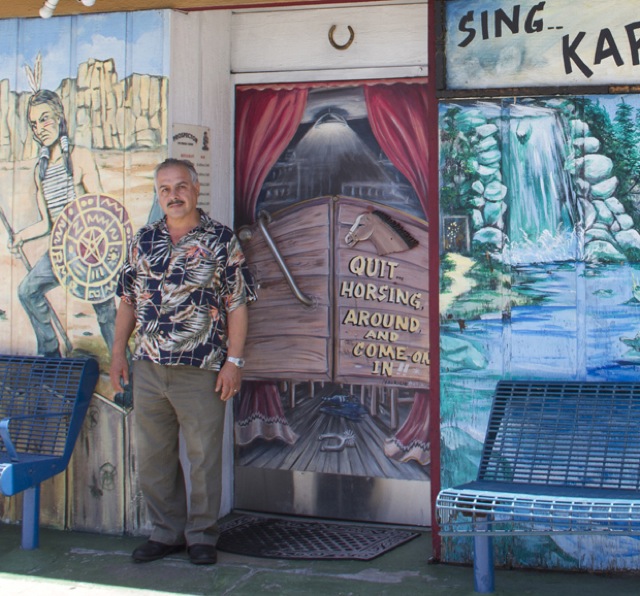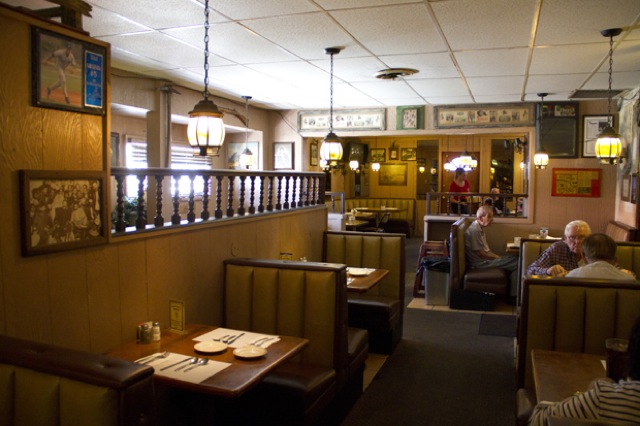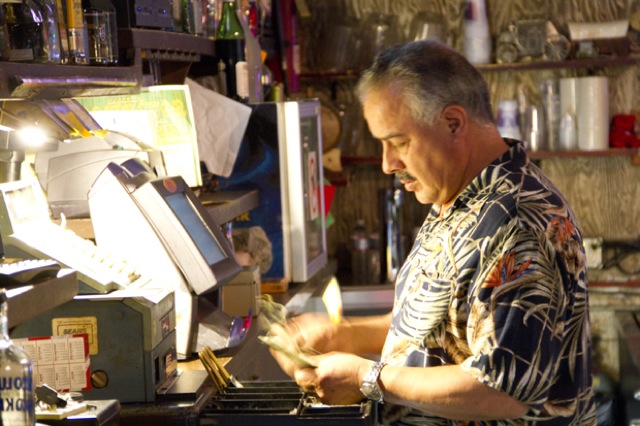
Photos courtesy of Trevor Roberson.
The Prospector—at least for me—is a Long Beach staple in the purest of terms. It lacks pretentiousness, it is utterly warm, and it is part of my beginning history with this city. It was the first place I saw a band in Long Beach (Limbeck to be specific). It was one of the first places I drank way too much at publicly. And for this Big Bear-born boy, its wood-paneled walls and old-school decor reminded me of the family steakhouses my grandparents would call the best.
But the aura of a place doesn’t just create itself, for as is sung, a house is not a home when no one is there. And perhaps my youthful naïveté had ignored that the warmth I had always felt with The Prospector was directly connected to the person who helped create it.
That person is Luis Lemus.
When you see him, you wouldn’t think he’s a boss. He is casual, a beautifully thick accent that naturally causes one to smile, and runs around with his hand in a little but of everything — but most certainly doesn’t have a pressing nature like most bosses seem to exert.
It is perhaps his story (an incredible one at that) that makes him so humble. Immigrating from Mexico in February of 1977 with a couple of cousins when he was 17, he came straight to Long Beach to come live with a brother. And The Prospector was, as he put it amusingly, “a mistake.”
Within a year of being here, Luis bounced back-and-forth between a plethora of jobs ranging from a bakery to a hamburger joint. He blames this on his stubbornness, having little patience for some of his employers. “I was offended,” he said of the bakery who, after he had worked for them for free for three months and blew out his shoulder, came back post-injury to be offered a dishwashing position.
As his English improved, he became the leader in achieving jobs for his family — and one of those jobs happened to be a dishwashing (ironically) position at The Prospector for his brother. However, overlap with his brother’s other job caused Luis to fill in for the first two days. He began noticing the cook leaving his post a bit too often and, without hesitation, hopped on the cooking line, checking tickets, and cooking orders.
Luckily, the boss was watching.
And he denied that boss’s initial offer to become a cook. However, after some sneaky bargaining — “Of course, I lied about how much I was making at my other job. I was making $3.90 an hour but I told her I was making $4.50” — he accepted the job as a cook at a higher rate than he could have ever expected: $5 bucks an hour.
After a year of a self-admitted dislike for The Prospector, he suddenly “got used to it,” as he put it. Perhaps it was the fact that he was slowly making the kitchen his own. Perhaps it was because no one questioned him. Perhaps it was the fact that a small family was being built. Either way, a customer at the bar told him one day, “Y’know, Luis, you’re gonna be the boss around here one day.”

He thought the claim was audacious. Without a penny saved and having bought a home here in Long Beach, he wasn’t thinking long-term in any sense except for the fact that he deeply wished to move back to Mexico. By 1992, however, the owner had expressed her exhaustion with the business and her plans to sell the restaurant and, in time, the land. With this, she wanted Luis to have first bid and told him he could lease it at first given his financial restraints.
This initial venture almost drove him to divorce and bankruptcy, as the first ten years of the business took on a high rent rate and even higher restrictions, ranging from his inability to alter the menu on any level to being unable to change the space physically. Frustrated with these stipulations, the owner finally came up to him to sell the land — and for Luis, all he could think about was the fact that if he owned the land, he would no longer have the exorbitant rent that was killing his profit margin. And after riskily getting a $100,000 loan — already being in another $100,000 of debt, mind you — for the down payment the owner was requesting, Luis purchased the entirety of The Prospector.
How, exactly, he was to get business up despite owning it all now was another thought entirely. Standing with the door open on its 7th Street-side entrance, he noticed a group of college kids. Knowing they were heading in, he sat them down to “buy them drinks and bullshit.” One of those college students was a kid named Wade, who expressed his frustration at the joint never being open when he wanted to drink with comrades. Confident though, he told Luis he could bring people in at least one night a week if Luis taught him how to bartend.

This relationship eventually proved key to The Prospector’s future, as the college kids began to flow, bands began to appear, his best patrons hung after-hours to help him renovate, and the history of the steak joint began to re-write itself. I am typically not one for hyperbolic catch tokens, but “American dream” becomes an understatement with Luis’s story — and not just because of the stereotypical immigrant-struggle-to-success aspect. It’s in its simplicity and everyday-ness that makes it beautifully American. With deep encouragement, I insist you pop your head in. If you’re thirsty, its dark, small bar is perfect for parched throats and stress-filled days. If your stomach needs to indulge, their fried chicken is decadent in all the right ways. Either way, it’s an inherent part of this city.
And don’t forget to say hi to Luis.
The Prospector is located at 2400 East 7th Street. 562-438-3839

